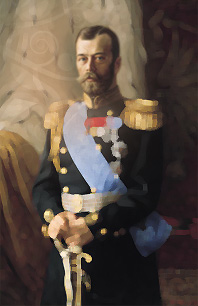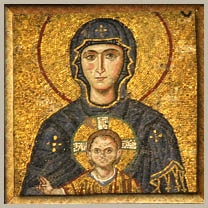Learn about the history and discover the mosaics of this monument of world architecture

First Days at Court - 1905
In one of the earliest days of 1905 my mother received a telegram from Princess Galatzina, first lady in waiting, saying that my immediate presence at Court was required. The Princess Orbeliani, also a lady in waiting, was seriously ill, and some one was needed to replace her in attendance on Her Majesty. I left at once for Tsarskoe Selo, then, as always, the favorite home of the Imperial Family, and on my arrival was conducted to the apartments in the palace known as the Lyceum. The rooms were small and dark with windows looking out on a little church. It was the first time I had ever been away from home, and in any surroundings I should have been homesick and forlorn, but in these unfriendly surroundings my spirits were with some excuse depressed.
The time of my coming to Court was unpropitious, the Imperial Family and all connections being in deep mourning for the Grand Duke Serge who, on the morning of February 4, had been barbarously assassinated. The Grand Duke Serge, uncle of Nicholas II, had been Governor of Moscow. He was undoubtedly a reactionary, and his rule was said to have been harsh. Certain it is that his administrative methods earned him the intense enmity of the Social Revolutionaries and he had long lived in danger of assassination. His wife, the Grand Duchess Elizabeth, was devoted to him inspite of his difficult temperment, and she never willingly allowed him to leave the palace of the Kremlin unaccompanied. Usually she went with him herself, but on this fatal February morning he, being in a dark mood, left the palace without her knowledge. Suddenly a great explosion shook all the windows, and the poor Grand Duchess, springing from her chair, cried out in an agonized voice: "It is Serge !"
Rushing out into the court she saw a horrible sight, the body of her husband scattered in a hundred bleeding fragments over the snow. The bomb had literally torn the unfortunate man to pieces, so that in the dismembered mass of flesh and blood there was nothing recognizable of what had been, only a few minutes before, a strong and dominating man.
The terrorist who threw the bomb was promptly arrested, tried, and sentenced to death. It was entirely characteristic of the Grand Duchess Elizabeth that in the midst of her grief and horror she still found room in her heart to pity the misguided wretch sitting in his cell waiting his miserable end. The Grand Duchess insisted on visiting the man in prison, assuring him of her forgiveness, and praying for him on the stone floor of his cell. Whether or not he joined in her prayers I do not know. The Social Revolutionaries prided themselves on being irreligious and very many of them were Jews.
The Court weighed down by this terrible tragedy was a sad enough place for a homesick girl like myself. Like all the other ladies in waiting I wore a black dress with a long veil, and when at length I was received by the Empress I found her, too, dressed in deep mourning. After this first formal reception I saw very little of the Empress, all her time being devoted to her sister, the Grand Duchess Elizabeth, and to Princess Henry of Prussia, who was visiting her. The Empress Dowager also came, so that the suite was thrown together in what for me was not altogether a pleasant association. My special duty, as I discovered, was attendance on the old Princess Orbeliani, whose illness, I am bound to admit, did not sweeten her disposition. But as she was dying of that terribly trying malady, creeping paralysis, I am ashamed, even now, to criticize her. For the other dames d'honneur, however, I have no hesitation to say that they were not on their best behavior. Being entirely a stranger at Court and unacquainted with insincerities which afterwards I came to know only too well, I suffered keenly from the cutting remarks of my colleagues. My French, which I own I spoke rather badly, came in for a great deal of ridicule. On the whole it was rather an unhappy period in my young life.
The one bright spot that I remember was a drive with the Empress to which I was summoned by telephone. It was a warm day in early spring and the snow around the tree roots along the road was thawing in the pale sunlight. We drove in an open carriage, a big Cossack, picturesquely uniformed, riding behind. It was my first public appearance with Royalty and I was a little confused as to how to behave in the presence of the low-bowing crowds that lined the way. The Empress, however, soon put me at my ease, chatting of simple things, talking of her children, especially of the infant heir, at that time about eight months old. Our drive was not very long because the Empress had to hurry back to superintend a dancing lesson of the young Grand Duchesses. I remember when I returned to the apartment of the invalid Princess Orbeliani, she commented rather maliciously on the fact that I was not invited to attend the dancing lesson. But by that time, alas! I knew that had I been invited her comment might have been more malicious still. Still I must not speak badly of the poor Princess, for in spite of her illness and approaching death she was very brave and kinder than most people in her circumstances would have been.
Lent came on and in the palace church there were held every Wednesday and Friday special services for the Imperial Family. I asked and was given permission to assist in these services and I found great solace in them. At that time also I became warmly attached to a maid of honor of the Grand Duchess Serge, Princess Shankovsky, a woman of rare character. She had recently lost her mother and was in a sad mood. Almost everyone, in fact, was sad at this time. The Grand Duchess Elizabeth, although she bore her tragedy with dignity and courage, went about with a white face and eyes in which horror still lingered. On religious holidays she laid aside her black robes and appeared all in white like a madonna.

Tsar Nicholas II


